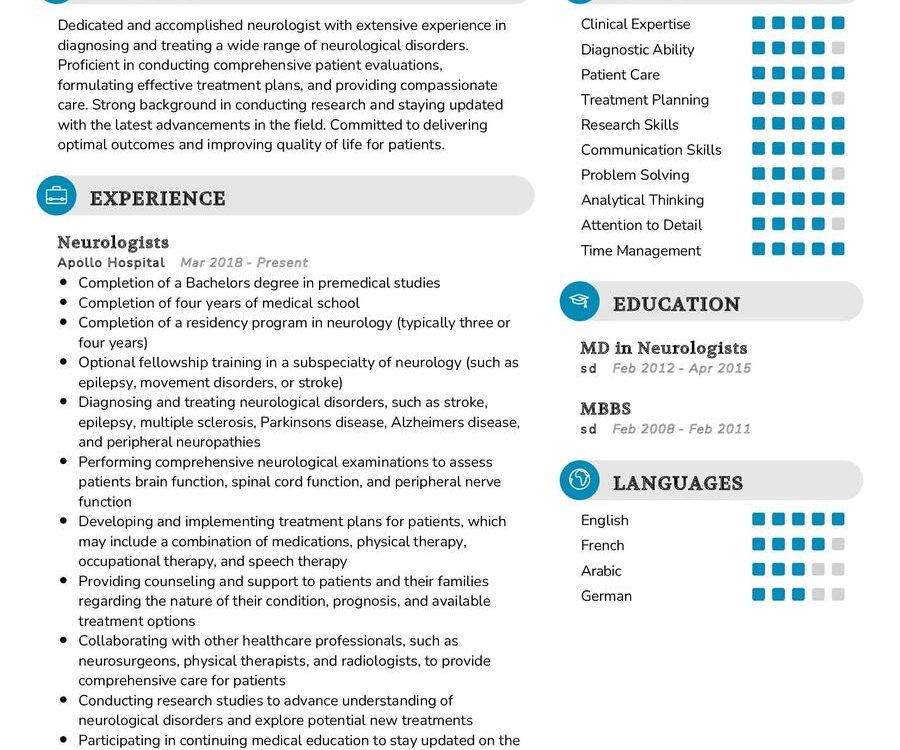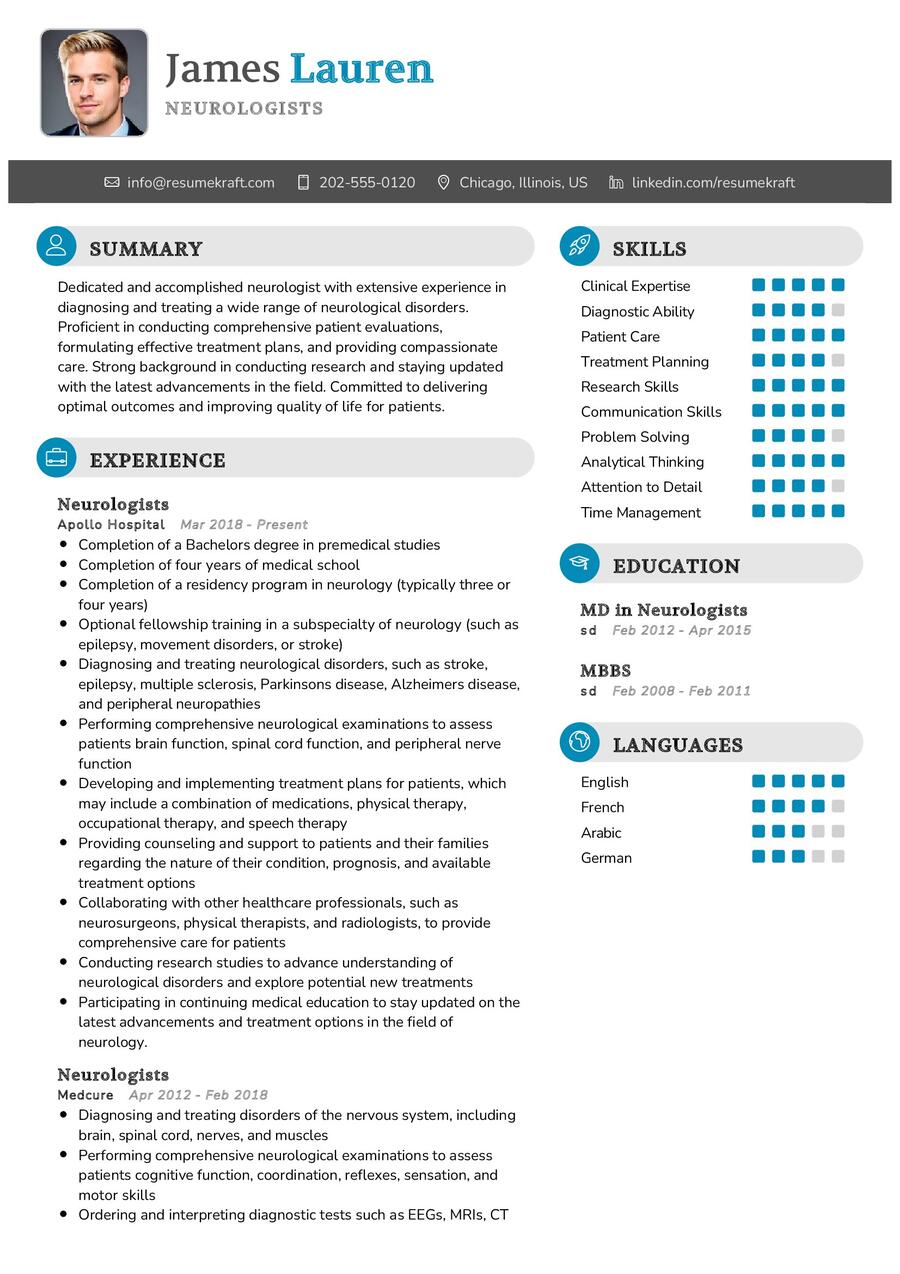Exploring the Role of Neurologists in Modern Healthcare
As the field of healthcare continues to advance, the role of Neurologists becomes increasingly crucial. This article delves into the multifaceted responsibilities and qualifications required for this specialized medical position, highlighting the unique blend of technical expertise and compassionate care that defines neurology.
What Does It Take to Become a Neurologist?
Embarking on the journey to become a Neurologist involves a comprehensive set of skills and qualifications. Let’s explore the key requirements that aspiring neurologists need to fulfill:
- A Bachelor’s degree in Medicine or a related field, setting the foundation for medical knowledge and skills.
- Successful completion of medical school, followed by residency training in neurology, to gain specialized expertise.
- Licensure and board certification, showcasing the legal and professional qualifications required to practice neurology.
- Continual learning through conferences, workshops, and staying updated on the latest advancements in neurology.
- Strong analytical and problem-solving skills, essential for diagnosing complex neurological conditions.
- Excellent communication and interpersonal skills to interact effectively with patients, their families, and healthcare teams.
Additionally, obtaining specialized certifications or fellowships in areas such as pediatric neurology or neurosurgery can enhance a neurologist’s profile in the competitive healthcare landscape.
Responsibilities of Neurologists
The role of a Neurologist is diverse and demanding, requiring a balance between medical expertise and empathy. Here are some core responsibilities associated with this profession:
- Conducting thorough patient assessments, including medical history, physical examinations, and diagnostic tests.
- Diagnosing and treating various neurological disorders such as epilepsy, stroke, multiple sclerosis, and Alzheimer’s disease.
- Developing personalized treatment plans, which may include medications, therapies, or surgical interventions.
- Collaborating with other healthcare professionals, such as radiologists and neurosurgeons, to provide comprehensive patient care.
- Educating patients and their families about neurological conditions, treatment options, and preventive measures.
- Participating in research and clinical trials to contribute to advancements in the field of neurology.
- Staying informed about emerging technologies and treatments to provide the best possible care to patients.
Each responsibility reflects the depth of knowledge and dedication required in the field of neurology, where every patient’s well-being is a priority.
Neurologist Resume Writing Tips
Crafting a compelling resume is essential for standing out in the competitive job market for neurologists. Here are some tips to create a resume that effectively communicates your skills and experiences:
- Highlight your academic achievements and medical credentials prominently in the resume.
- Detail specific cases or patient outcomes that demonstrate your expertise in diagnosing and treating neurological disorders.
- Include any research publications, conference presentations, or contributions to the field of neurology.
- Showcase your communication skills by emphasizing patient education and collaboration with interdisciplinary healthcare teams.
- List any additional certifications, fellowships, or specialized training that enhances your neurology qualifications.
Your resume is your professional narrative, showcasing your journey as a neurologist and your commitment to providing exceptional patient care.
Neurologist Resume Summary Examples
Your resume summary serves as an introduction to your professional story. Here are some examples tailored for neurologists:
- “Dedicated Neurologist with a proven track record in diagnosing and treating diverse neurological conditions. Committed to staying at the forefront of medical advancements for the well-being of my patients.”
- “Board-certified Neurologist with a passion for research and a focus on delivering personalized care. Experienced in collaborating with interdisciplinary teams to achieve positive patient outcomes.”
- “Skilled Neurologist with expertise in both adult and pediatric neurology. A compassionate healthcare professional dedicated to improving the lives of individuals facing neurological challenges.”
Your resume summary encapsulates your unique qualities and sets the tone for the hiring manager’s understanding of your neurology expertise.
Create a Comprehensive Experience Section
Your experience section is the heart of your resume, providing a detailed account of your professional journey. Here are some examples to guide you:
- “Led a neurology team in a busy urban hospital, overseeing the diagnosis and treatment of a wide range of neurological disorders.”
- “Contributed to groundbreaking research on neurodegenerative diseases, presenting findings at international conferences and contributing to medical publications.”
- “Established a neurology clinic focused on providing specialized care to pediatric patients, collaborating with pediatricians and other specialists.”
Each experience highlighted in your resume narrates a chapter in your neurology career, emphasizing your leadership, research contributions, and commitment to specialized care.
Educational Achievements for Neurologists
Your educational journey is a testament to your commitment to the field of neurology. Showcase your academic achievements with details like:
- Doctor of Medicine (MD), [Your Medical School], [Year of Graduation].
- Residency in Neurology, [Hospital/Institution], [Years of Residency].
- Board Certification in Neurology, [Certifying Board], [Year of Certification].
- Additional Fellowship in [Specialized Area], [Institution], [Year of Completion].
Your educational milestones form the foundation of your expertise as a neurologist, and each qualification reflects your dedication to continuous learning.
Key Skills for Neurologists
Neurologists possess a unique set of skills that contribute to their success in patient care and medical advancements. Here are essential soft and hard skills for neurologists:
Soft Skills:
- Empathy and bedside manner, crucial for building trust with patients and their families.
- Effective communication, both with patients and interdisciplinary healthcare teams.
- Problem-solving abilities, essential for diagnosing complex neurological conditions.
- Attention to detail, ensuring accurate assessments and precise treatment plans.
- Adaptability, as the field of neurology continually evolves with new research and technologies.
Hard Skills:
- Neurological examination techniques, including reflex testing and sensory assessments.
- Interpretation of diagnostic tests, such as MRI scans and EEGs.
- Knowledge of the latest advancements in neurology and related medical technologies.
- Proficiency in electronic health record (EHR) systems for accurate patient documentation.
- Collaboration with other specialists for comprehensive patient care.
Each skill contributes to the holistic care provided by neurologists, showcasing their ability to navigate the complexities of neurological medicine.
Common Mistakes to Avoid When Writing a Neurologist Resume
As you craft your resume, steer clear of common mistakes that can hinder your chances of securing your dream neurology position:
- Avoid generic statements; tailor your resume to highlight your unique qualifications and experiences.
- Don’t just list duties; provide specific examples of how you made a positive impact on patient outcomes or contributed to research.
- Include a well-crafted cover letter to complement your resume and showcase your enthusiasm for the neurology position.
- Ensure clarity in your resume by avoiding excessive medical jargon that may be challenging for non-medical professionals to understand.
- Proofread meticulously to present a polished and professional image to potential employers.
Avoiding these common mistakes ensures that your neurologist resume effectively communicates your expertise and suitability for the position.
Key Takeaways for Your Neurologist Resume
As we conclude this comprehensive guide to crafting an impactful neurologist resume, remember these key takeaways:
- Emphasize your unique journey, showcasing academic achievements, professional experiences, and contributions to the field of neurology.
- Showcase your technical proficiency, including specialized skills and knowledge relevant to neurology.
- Detail any strategic initiatives you have spearheaded, such as leading research projects or establishing specialized clinics.
- Include a section on continuous learning, highlighting certifications, fellowships, or ongoing education that enhances your neurology qualifications.
Finally, feel free to utilize resources like AI Resume Builder, Resume Design, Resume Samples, Resume Examples, Resume Skills, Resume Help, Resume Synonyms, and Job Responsibilities to create a standout application and prepare for the neurology job interview.
Armed with these insights and tips, you are now ready to craft a resume that not only showcases your expertise as a neurologist but also resonates with potential employers. Best of luck in your neurology career!


